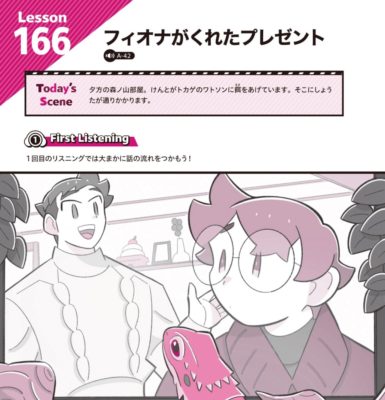中高生の基礎英語 in English 24/1/15(月) T20-D1 Do you volunteer?
ブログ記事の抜粋
中高生の基礎英語 in English 24/1/15(月) T20-D1 Do you volunteer?
Topic 20 Do you volunteer? Day 1
1日目は、 トピックに関する単語や表現を学びましょう。
(On the first day, learn vocabulary and expressions related to the topic.)
-Warm-up
今週のトピックについて、 今のあなたの考えを書いてみましょう。
(Write down your current thoughts about this week’s topic.)
Do you volunteer?
-New Words, New Phrases
ダイアログを理解するためのポイントとなる単語と表現です。意味や使い方が理解できたらチェックを入れましょう。(These are words and expressions that are key to understanding the dialogue. Check the box if you understand the meaning and usage.)
make it
pick up
trash
-Conversation Strategy
会話を続けるために役立つ表現を学びましょう。 今回は「手助けをお願いするときの表現」です。
(Learn useful expressions to keep the conversation going. This time we will talk about expressions used when asking for help.)
Could you do me a favor?
favor (親切、 願い)という言葉を使って、 「お願いを聞いてもらえますか」 と、 誰かに何かお願いごとをするときに使えます。 それが小さなことなら、 Could you do me a little favor?、 もっと手間がかかることなら、 Could you do me a big favor? と言いましょう。
Would you be willing to tutor a classmate in math?
Would you agree to teach math to a classmate?
(クラスメートに数学を教えてくれませんか?)と同じ意味です。
3人のトークから、 どんな単語や表現が聴き取れましたか? 書いてみましょう。
(What words and expressions did you hear from the three people’s talks? Write them down.)
–
charity
help, often money, given for free to people who are in need
get paid
to receive money for work completed
local
belonging to the area where you live
childcare
taking care of children
on time
at the correct time or the time that was arranged
neighborhood
a section of a city; an area within a city that represents the idea of people or businesses being near each other
empty
having nothing inside
mop
be willing to
to be happy to do something if it is needed
catch up on
to make progress on something or continue to do something that you have not been able to do recently
-中高生の基礎英語 ♪ ♪ in English! ♪
Hello, everybody, and thank you for being with us. My name is Gary Scott Fine.
Hi, everyone. I’m Hannah Grace. I’m so happy you joined us today.
Hello, I’m Nakamura Riku. Let’s have a fun week.
Yay!
Let’s do it!
All right, then. Let’s start the lesson.
♪ Topic 20, Day 1.
Let’s warm up by chatting about this week’s topic,
which is: Do you volunteer?
Do you volunteer?
“To volunteer.” Riku, do you know what “to volunteer” means?
“To volunteer” means “charity”?
Ah, yes.
Something like that. Yes. “To volunteer” means “to choose to do something that you don’t have to do.”
Yes. You say, “I’ll do it,” even though you don’t have to do it, and you won’t get paid – you won’t get money to do it.
That’s right. When you volunteer, you don’t get paid.
What are some examples of ways that people volunteer?
Well, some people volunteer by cleaning places like parks and beaches.
Right. They take away paper and bottles and plastic to help keep those places clean.
Riku, can you think of another example of something that people do to volunteer?
In summer festival, I help people make kakigōri and…
Yeah.
So, you help with your local festival.
Yes.
That’s great. Good example.
Great example, yes.
You could also volunteer by spending time with people, talking or doing activities with them.
Yes. And you can help tutor students or do childcare for parents.
So, this week, we’ll be discussing our ideas about volunteer activities.
And Riku, on Day 5, you’ll share your thoughts about volunteering.
Okay.
Now, let’s look at this week’s dialogue.
Ken enters the family restaurant where he often goes to play video games with his friend Reo.
He sees his classmate Saki sitting alone. He walks up to her.
-Dialogue 1st Listen

